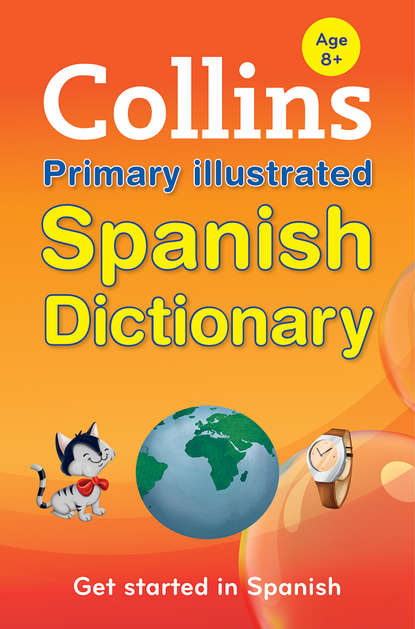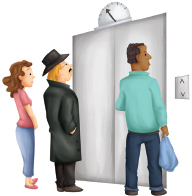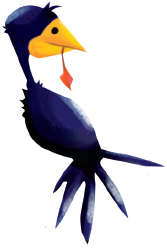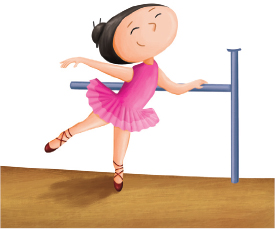
Полная версия:
Collins Primary Dictionaries
el arco NOUN
1 bow
2 arch el arco iris the rainbow
arder VERB
to burn Ese tronco no va a arder. That log won’t burn. ¡La sopa está ardiendo! The soup’s boiling hot!
la ardilla NOUN
squirrel
el área FEM NOUN
area
la arena NOUN
sand arenas movedizas quicksand
armar VERB
1 to assemble El juguete viene desmontado y luego tú lo armas. The toy comes in pieces and you assemble it.
2 to make Los vecinos de arriba arman mucho jaleo. Our upstairs neighbours make a lot of noise. armarse un lío to get in a muddle Me voy a armar un lío con tantos números. I’m going to get into a muddle with all these numbers.
el armario NOUN
1 cupboard un armario de cocina a kitchen cupboard
2 wardrobe
arrancar VERB
1 to pull up Estaba arrancando malas hierbas. I was pulling up weeds.
2 to pull out Le arranqué una espina del dedo. I pulled a thorn out of his finger.
arrastrar VERB
to drag Arrastraba una maleta enorme. He was dragging an enormous suitcase.
■ arrastrarse to crawl Llegaron hasta la valla arrastrándose. They crawled up to the fence.
arreglar VERB
to fix ¿Sabrás arreglarme el grifo? Could you fix the tap for me?
arreglarse VERB
1 to get ready Se arregló para salir. She got ready to go out.
2 to work out Ya verás como todo se arregla. It’ll all work out, you’ll see.
el arreglo NOUN
repair El tostador sólo necesita un pequeño arreglo. The toaster only needs a minor repair. Esta tele no tiene arreglo. This TV is unrepairable. Este problema no tiene arreglo. There’s no solution to this problem.
arriba ADVERB
1 above Los platos y las tazas están arriba. The plates and mugs are above. Visto desde arriba parece más pequeño. Seen from above it looks smaller. Pon esos libros arriba del todo. Put those books on top.
2 upstairs Arriba están los dormitorios. The bedrooms are upstairs. los vecinos de arriba our upstairs neighbours
más arriba further up
arriesgado (FEM arriesgada) ADJECTIVE
risky
la arroba NOUN
at Mi e-mail es loveday arroba collins punto E-S (loveday@collins.es). My email address is loveday at collins dot E-S (loveday@collins.es).
arrojar VERB
to throw Arrojaban piedras y palos. They were throwing sticks and stones.
el arroyo NOUN
stream
el arroz NOUN
rice

arroz blanco white rice arroz con leche rice pudding
la arruga NOUN
1 wrinkle
2 crease
el arte (PL las artes) NOUN
art el arte abstracto abstract art
el artículo NOUN
article el artículo determinado the definite article el artículo indeterminado the indefinite article
artificial (FEM artificial) ADJECTIVE
artificial
el/la artista NOUN
1 artist
2 un artista an actor una artista an actress
asar VERB
to roast asar algo a la parrilla to grill something
Me aso de calor. I’m boiling.
el ascensor NOUN
lift

el asco NOUN
El ajo me da asco. I think garlic’s revolting. La casa está hecha un asco. The house is filthy.
¡Qué asco! How revolting!
el aseo NOUN
el aseo personal personal hygiene los aseos the toilets
así ADVERB
1 like this Se hace así. You do it like this.
2 like that Es así: como lo hace Jorge. It’s like that: the way Jorge is doing it. ¿Ves aquel abrigo? Quiero algo así. Do you see that coat? I’d like something like that. un tomate así de grande a tomato this big
el asiento NOUN
seat el asiento delantero the front seat el asiento trasero the back seat
la asignatura NOUN
subject Tiene dos asignaturas pendientes. He’s got two subjects to retake.
asomar VERB
No asomes la cabeza por la ventanilla. Don’t lean out of the window. Asómate a la ventana. Look out of the window.
asombrar VERB
to amaze Me asombra que no lo sepas. I’m amazed you don’t know.
■ asombrarse to be amazed Se asombró de lo tarde que era. He was amazed at how late it was.
el aspecto NOUN
appearance A ver si cuidas más tu aspecto. You need to take a bit more care with your appearance.
la aspiradora NOUN
vacuum cleaner
asqueroso (FEM asquerosa) ADJECTIVE
1 disgusting
2 filthy Esta cocina está asquerosa. This kitchen is filthy.
el asunto NOUN
matter Es un asunto muy delicado. It’s a very delicate matter. No me gusta que se metan en mis asuntos. I don’t like anyone meddling in my affairs. ¡Eso no es asunto tuyo! That’s none of your business!
asustar VERB
1 to frighten

No me asustan los fantasmas. I’m not frightened of ghosts.
2 to startle ¡Huy! Me has asustado. Goodness! You startled me.
■ asustarse to get frightened Se asusta por nada. He gets frightened over nothing.
atacar VERB
to attack
el atajo NOUN
short cut Cogeremos un atajo. We’ll take a short cut.
el ataque NOUN
attack un ataque contra alguien an attack on somebody Le dio un ataque de risa. He burst out laughing.
atar VERB
to tie Ata al perro a la farola. Tie the dog to the lamppost. Átate los cordones. Tie your shoelaces up.
atardecer
atardecer can be a verb or a noun.
A VERB
to get dark Está atardeciendo. It’s getting dark.
B MASC NOUN
dusk
al atardecer at dusk
el atasco NOUN
traffic jam
atención
atención can be a noun or an exclamation.
A FEM NOUN
Hay que poner más atención. You should pay more attention. Escucha con atención. Listen carefully. El director del colegio le llamó la atención. The headmaster gave him a talking-to. Estás llamando la atención con esa ropa. You’re attracting attention to yourself in those clothes.
B EXCLAMATION
¡Atención, por favor! May I have your attention please? ‘¡Atención!’ ‘Danger!’
el atentado NOUN
attack un atentado terrorista a terrorist attack
atento (FEM atenta) ADJECTIVE
thoughtful Es un chico muy atento. He’s a very thoughtful boy. Estaban atentos a las explicaciones del profesor. They were paying attention to the teacher’s explanations.
el aterrizaje NOUN
landing un aterrizaje forzoso an emergency landing
aterrizar VERB
to land
atiendo VERB ▷see atender Ahora mismo la atiendo. I will be with you right away.
la atracción (PL las atracciones) NOUN
attraction una atracción turística a tourist attraction sentir atracción por algo to be attracted to something Sentía atracción por él. I was attracted to him.
atractivo (FEM atractiva) ADJECTIVE
attractive un hombre muy atractivo a very attractive man
atrapar VERB
to catch Mi gato atrapa pájaros. My cat catches birds.
atrás ADVERB
1 Los niños viajan siempre atrás. The children always travel in the back. la parte de atrás the back el asiento de atrás the back seat
2 Mirar hacia atrás. To look back. Está más atrás. It’s further back. ir para atrás to go backwards
3 El coche de atrás va a adelantarnos. The car behind is going to overtake us. Yo me quedé atrás porque iba muy cansado. I stayed behind because I was very tired.
atrasado (FEM atrasada) ADJECTIVE
1 backward Es un país muy atrasado. It’s a very backward country.
2 behind Va bastante atrasado en la escuela. He’s rather behind at school. Tengo mucho trabajo atrasado. I’m very behind with my work.
3 El reloj está atrasado. The clock’s slow.
atravesar VERB
to cross Atravesamos el río. We crossed the river.
atreverse VERB
to dare No me atreví a decírselo. I didn’t dare tell him. No me atrevo. I daren’t.
atropellar VERB
to run over Un coche atropelló al perro. The dog was run over by a car.
el aula FEM NOUN
classroom

el aumento NOUN
increase Ha habido un aumento de los precios. There’s been an increase in prices.
aun ADVERB
even Aun sentado me duele la pierna. Even when I’m sitting down, my leg hurts.
aun así even so
aún ADVERB
1 still Aún me queda un poco para terminar. I’ve still got a little bit left to finish. ¿Aún te duele? Is it still hurting?
2 yet Aún no ha llegado mi madre. My mum hasn’t arrived yet. Y aún no me has devuelto el libro. You still haven’t given me the book back.
3 even La película es aún más aburrida de lo que creía. The film’s even more boring than I thought it would be.
aunque CONJUNCTION
1 although Me gusta el francés, aunque prefiero el alemán. I like French, although I prefer German. Estoy pensando en ir, aunque no sé cuándo. I’m thinking of going, though I don’t know when. Seguí andando, aunque me dolía mucho la pierna. I went on walking, even though my leg was hurting a lot. No te lo daré, aunque protestes. You can complain all you like but you’re not getting it.
2 even if Pienso irme, aunque tenga que salir por la ventana. I shall leave, even if I have to climb out of the window.
ausente (FEM ausente) ADJECTIVE
absent
auténtico (FEM auténtica) ADJECTIVE
1 real Es un auténtico campeón. He’s a real champion.
2 genuine El cuadro era auténtico. The painting was genuine.
el autobús (PL los autobuses) NOUN
bus
en autobús by bus
automático (FEM automática) ADJECTIVE
automatic
la autopista NOUN
motorway autopista de peaje toll motorway
el autor la autora NOUN
author
la autoridad NOUN
authority
autorizar VERB
to authorize No le han autorizado la entrada al país. His entry into the country hasn’t been authorized.
auxilio EXCLAMATION
help!
avanzar VERB
to make progress Isabel avanzó mucho el pasado trimestre. Isabel made a lot of progress last term.
el ave FEM NOUN
bird

un ave de rapiña a bird of prey
la aventura NOUN
adventure Te contaré nuestras aventuras en la playa. I’ll tell you about our adventures at the beach.
avergonzar VERB
to embarrass Me avergonzaste delante de todos. You embarrassed me in front of everyone. Me avergüenzan estas situaciones. I find this sort of situation embarrassing. avergonzarse de algo to be ashamed of something No hay de qué avergonzarse. There’s nothing to be ashamed of.
la avería NOUN
El coche tiene una avería. The car has broken down.
averiarse VERB
to break down
el avión (PL los aviones) NOUN
plane
ir en avión to fly
avisar VERB
1 to warn Ya nos avisaron de que haría mucho frío. They warned us that it would be very cold.
2 to let … know Avísanos si hay alguna novedad. Let us know if there’s any news.
el aviso NOUN
notice Había un aviso en la puerta. There was a notice on the door.
la avispa NOUN
wasp
ay EXCLAMATION
1 ow! ¡Ay! ¡Me has pisado! Ow! You’ve trodden on my toe!
2 oh no! ¡Ay! ¡Creo que nos han engañado! Oh no! I think they’ve cheated us!
ayer ADVERB
yesterday ayer por la mañana yesterday morning ayer por la tarde yesterday afternoon/yesterday evening
Language tip
ayer por la tarde has two meanings. It can be translated as yesterday afternoon and yesterday evening.
ayer por la noche last night
antes de ayer the day before yesterday
la ayuda NOUN
help Gracias por tu ayuda. Thanks for your help.
el/la ayudante NOUN
assistant
ayudar VERB
to help ¿Me ayudas con los ejercicios? Could you help me with these exercises? Me está ayudando a hacer los deberes. He’s helping me do my homework.
el ayuntamiento NOUN
1 town hall
2 city hall
la azafata NOUN
air-hostess
el azúcar NOUN
sugar
azul ADJECTIVE, MASC NOUN
blue una puerta azul a blue door azul celeste sky blue azul marino navy blue Yo iba de azul. I was wearing blue.
B b
el bache NOUN
1 pothole
2 bump
el Bachillerato NOUN
Did you know…?
The Bachillerato is a two-year secondary school course leading to university.
la bacteria NOUN
bacterium
la bahía NOUN
bay
bailar VERB
to dance sacar a bailar a alguien to ask somebody to dance
el bailarín la bailarina NOUN (MASC PL los bailarines)
dancer

el baile NOUN
dance Me han invitado a un baile. I have been invited to a dance.
bajar VERB
1 to go down Bajó la escalera muy despacio. He went down the stairs very slowly.
2 to come down Baja y ayúdame. Come down and help me.
3 to take down ¿Has bajado la basura? Have you taken the rubbish down?
4 to bring down ¿Me bajas el abrigo? Could you bring my coat down?
5 to fall Han bajado los precios. Prices have fallen.
6 to turn down Baja la radio. Turn the radio down.
7 to download
■ bajarse de to get off/to get out of/ to get down from
Language tip
bajarse de has three meanings. Look at the examples.
Se bajó del autobús antes que yo. He got off the bus before me. ¡Bájate del coche! Get out of the car! ¡Bájate del árbol! Get down from the tree!
bajo (FEM baja)
bajo can be an adjective, a preposition or an adverb.
A ADJECTIVE
1 low una silla muy baja a very low chair la temporada baja the low season Hablaban en voz baja. They were speaking quietly.
2 short Mi hermano es muy bajo. My brother is very short.
3 ground Viven en la planta baja. They live on the ground floor.
B PREPOSITION
under Juan llevaba un libro bajo el brazo. Juan was carrying a book under his arm.
C ADVERB
1 low El avión volaba muy bajo. The plane was flying very low.
2 quietly ¡Habla bajo! Speak quietly!
la bala NOUN
bullet
el balcón (PL los balcones) NOUN
balcony
la baldosa NOUN
tile
la ballena NOUN
whale
el ballet (PL los ballets) NOUN
ballet



